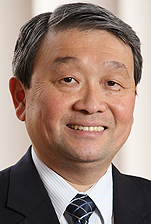 Min-Jer Chen is one of the most well-known Chinese management scholars in the world. In recent years he has become a leading authority in strategic management, known for his pioneering work in competitive dynamics and his expertise in Chinese-Western business strategy and execution. As well as teaching at Tsinghua University, he is the Leslie E. Grayson Professor at the Darden Graduate School of Business, University of Virginia. And in August 2012 he was appointed as the new president of the Academy of Management with an international membership of 19,500. But he remains modest. "Although I am in a relatively central position now, I still treat myself as a man on the margins. I remind myself that I should do something for society to keep myself dynamic,” says Dr. Chen frankly. Min-Jer Chen is one of the most well-known Chinese management scholars in the world. In recent years he has become a leading authority in strategic management, known for his pioneering work in competitive dynamics and his expertise in Chinese-Western business strategy and execution. As well as teaching at Tsinghua University, he is the Leslie E. Grayson Professor at the Darden Graduate School of Business, University of Virginia. And in August 2012 he was appointed as the new president of the Academy of Management with an international membership of 19,500. But he remains modest. "Although I am in a relatively central position now, I still treat myself as a man on the margins. I remind myself that I should do something for society to keep myself dynamic,” says Dr. Chen frankly.
When East meets West
Born in Taiwan 57 years ago, Chen went on to graduate from Zhong Xing University in Taiwan and went to America for further study when he was 17. He obtained his master’s and then his doctor’s degree of business management from the University of Maryland. “At the beginning, I just wanted to gain more knowledge and never thought about the contributions I would make later,” says Dr. Chen.
With the pure purpose of learning, he became a teacher in institutions like Columbia University, Pennsylvania's Wharton school of business and the University of Virginia – and he has been at the business school in Virginia ever since. With his advanced knowledge and teaching experiences from western countries, he found himself much in demand in China, where he taught MBA courses in many famous universities like Tsinghua, Peking and Fudan.
However, the famous scholar who accepted western management education for so many years admits he has a profound “traditional Chinese cultural complex”, which deeply influences both his academic work and his philosophy of life. “My roots are in China”, he says.
As a student of Chinese researcher Aixinjueluo Yunxin, he read over and over again the Four Books and Five Classics and other Pre-Qin philosophy. Based on these, he put forward the concepts of “dynamic competition” and "benevolence", to explain the relationship of business competitors from a “dual” perspective.
The pioneer of dynamic competition strategy
The theory of dynamic competition, which was first put forward by Dr. Chen has had an important influence in academic circles. In Chen’s eyes, this concept has profound and abundant meanings, but says, “To put it simply, competition is back and forth, offensive and defensive.” He emphasises that, this has nothing to do with a “fight to the death”. On the contrary, it is about how to make competition a force for companies to progress. In fact, a company will never move forward without it. “What we want competition to bring is more vitality and sustainable development,” he says.
In dynamic competition, an important idea is to think from the opponent’s perspective. In fact, it is similar to “transposition thinking”: it means to know yourself as well as to know your opponents. “When I talk about strategy, it is at a philosophical level,” says Chen. He believes that temperament is to a person what culture is to an enterprise. And, no matter how much money a person makes, he or she will come back to a perspective of humanity ultimately.
Teaching on the Tsinghua-INSEAD EMBA (TIEMBA)
As a teacher at Tsinghua’s School of Economics and Management, Chen teaches strategy courses on the TIEMBA programme. Although his classes are always highly rated by students, the professor does not see himself as a teacher. “I never present myself as a teacher. The concept of ‘student’ hasn’t come to my mind for almost 20 years,” says Chen. “The students can call me teacher to show their politeness, but I can’t look upon myself as a teacher. For me, it is a heavy burden. I make it my role as a person to accompany the students as they learn and progress.”
After all, in general, EMBA students have rich knowledge and experience themselves. So Chen also sees himself as providing a place for others to communicate. In his classes, he never speaks blindly and endlessly, but lets the students talk about their thoughts and their own companies. Students apply the theoretical frameworks they have learned in class to practical problems they have met in real life. “They talk about their own personal experience and true feelings,” Chen says. “Through these discussions they find their own sense of mission.”
In short, Chen’s courses break down the traditional boundary of teaching and learning. What his students get from him is not just knowledge, but also a platform to harvest understanding and grow together.
|  Latest News
Latest News